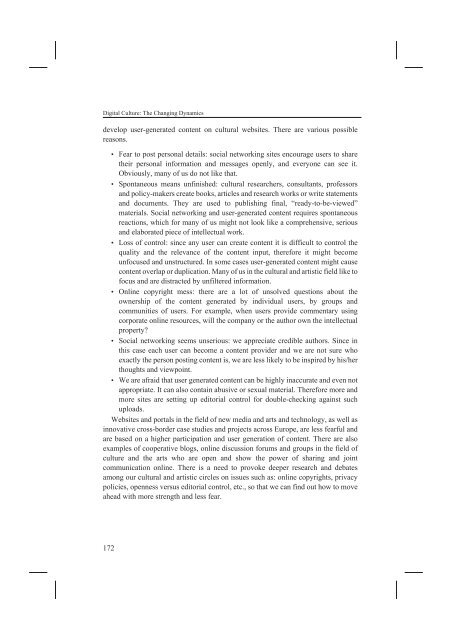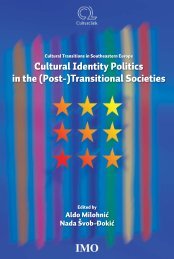D:\Documents and Settings\Ana\My Documents\Biserka-knjiga ...
D:\Documents and Settings\Ana\My Documents\Biserka-knjiga ...
D:\Documents and Settings\Ana\My Documents\Biserka-knjiga ...
Create successful ePaper yourself
Turn your PDF publications into a flip-book with our unique Google optimized e-Paper software.
Digital Culture: The Changing Dynamics<br />
develop user-generated content on cultural websites. There are various possible<br />
reasons.<br />
• Fear to post personal details: social networking sites encourage users to share<br />
their personal information <strong>and</strong> messages openly, <strong>and</strong> everyone can see it.<br />
Obviously, many of us do not like that.<br />
• Spontaneous means unfinished: cultural researchers, consultants, professors<br />
<strong>and</strong> policy-makers create books, articles <strong>and</strong> research works or write statements<br />
<strong>and</strong> documents. They are used to publishing final, “ready-to-be-viewed”<br />
materials. Social networking <strong>and</strong> user-generated content requires spontaneous<br />
reactions, which for many of us might not look like a comprehensive, serious<br />
<strong>and</strong> elaborated piece of intellectual work.<br />
• Loss of control: since any user can create content it is difficult to control the<br />
quality <strong>and</strong> the relevance of the content input, therefore it might become<br />
unfocused <strong>and</strong> unstructured. In some cases user-generated content might cause<br />
content overlap or duplication. Many of us in the cultural <strong>and</strong> artistic field like to<br />
focus <strong>and</strong> are distracted by unfiltered information.<br />
• Online copyright mess: there are a lot of unsolved questions about the<br />
ownership of the content generated by individual users, by groups <strong>and</strong><br />
communities of users. For example, when users provide commentary using<br />
corporate online resources, will the company or the author own the intellectual<br />
property?<br />
• Social networking seems unserious: we appreciate credible authors. Since in<br />
this case each user can become a content provider <strong>and</strong> we are not sure who<br />
exactly the person posting content is, we are less likely to be inspired by his/her<br />
thoughts <strong>and</strong> viewpoint.<br />
• We are afraid that user generated content can be highly inaccurate <strong>and</strong> even not<br />
appropriate. It can also contain abusive or sexual material. Therefore more <strong>and</strong><br />
more sites are setting up editorial control for double-checking against such<br />
uploads.<br />
Websites <strong>and</strong> portals in the field of new media <strong>and</strong> arts <strong>and</strong> technology, as well as<br />
innovative cross-border case studies <strong>and</strong> projects across Europe, are less fearful <strong>and</strong><br />
are based on a higher participation <strong>and</strong> user generation of content. There are also<br />
examples of cooperative blogs, online discussion forums <strong>and</strong> groups in the field of<br />
culture <strong>and</strong> the arts who are open <strong>and</strong> show the power of sharing <strong>and</strong> joint<br />
communication online. There is a need to provoke deeper research <strong>and</strong> debates<br />
among our cultural <strong>and</strong> artistic circles on issues such as: online copyrights, privacy<br />
policies, openness versus editorial control, etc., so that we can find out how to move<br />
ahead with more strength <strong>and</strong> less fear.<br />
172



